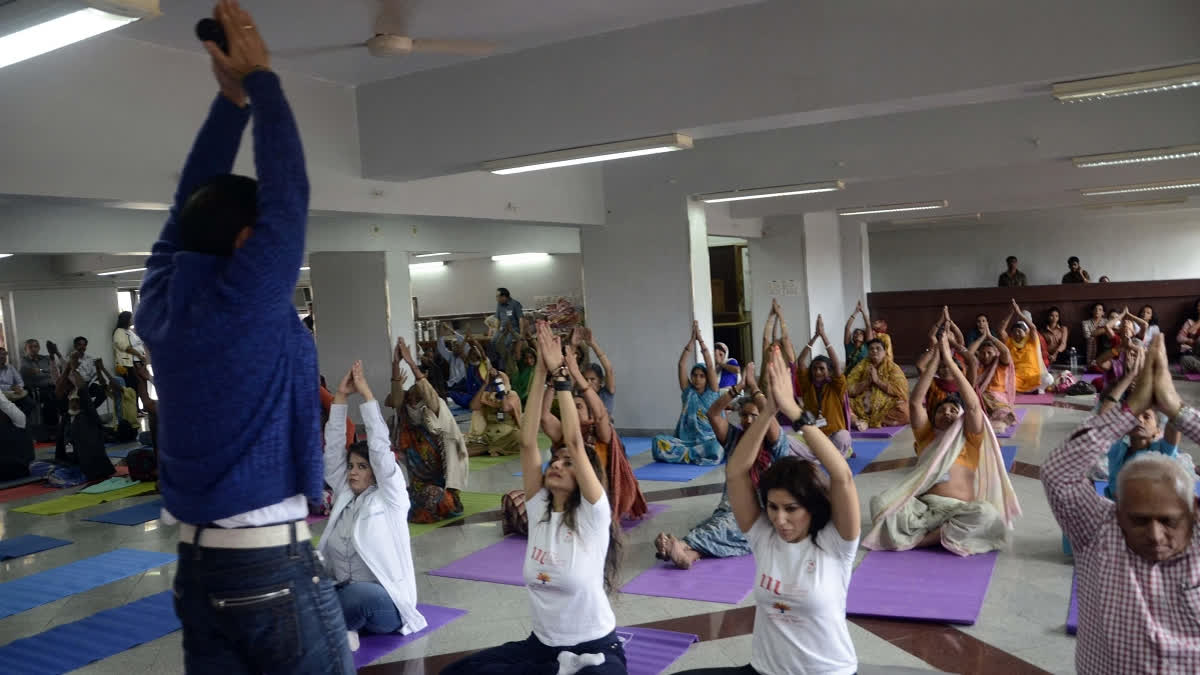United Nations: Meditation transcends all religions and borders and is also a powerful instrument of diplomacy in the current global landscape marked by escalating conflicts and deep-seated mistrust, top spiritual and UN leaders said on the first World Meditation Day commemorated here.
The Permanent Mission of India to the United Nations organised a special event ‘Meditation for Global Peace and Harmony’ to mark the first World Meditation Day at the global body’s headquarters on Friday.
"Today meditation is not a luxury, as it was thought, but it is a necessity,” spiritual leader Gurudev Sri Sri Ravi Shankar said in his keynote address at the packed event attended by UN Ambassadors, officials, staff, civil society members as well as members of the Indian-American diaspora.
“Meditation is something you can do anywhere, everywhere, by everyone. In this sense, international Meditation Day plays a very important role and opens the door to those who have some reservations,” he said.
He added that for many people, the moment they hear the word meditation, they may feel that the practice either has to be from some religion or it is not taught in their religion.
He underscored that meditation "transcends all religions, all geographical boundaries and age groups so it is very, very useful in many, many ways.” President of the 79th session of the UN General Assembly Philemon Yang said in his remarks that meditation “transcends borders, faiths, traditions and time, offering each of us the opportunity to pause, to listen and to connect with our inner selves.”
Yang said that the world today needs peace more than ever before. “The tensions in the world require that we embrace peace and anything that brings peace….Let us build on the practice we have shared to bring about a safer, more just and equitable future for everyone, everywhere.”
Earlier this month, the 193-member UN General Assembly unanimously adopted a resolution declaring December 21 as World Meditation Day. India was a member of the core group of countries that guided the unanimous adoption of the resolution titled ‘World Meditation Day’ in the UNGA. Andorra, Liechtenstein, Mexico, Nepal and Sri Lanka were the other members of the core group.
Under-Secretary-General for Operational Support Atul Khare said at the event that at the UN, civilian and uniform personnel work tirelessly on the world's most pressing challenges with colleagues operating under high pressure, including in high-risk environments, often far away from their family and country of origin.
“This can and does take a toll on their mental health. Our uniform personnel are often tasked with protecting civilians against physical violence, and are often themselves exposed to atrocities, war crimes and crimes against humanity,” Khare said.
While the physical safety of peacekeepers is of utmost importance, it is equally critical that their mental health is also taken care of, he said. In this context, Khare said that a special app called ‘MindCompanion’ was launched by the UN in October this year. The app is aimed at increasing awareness and understanding of mental health issues and its self-assessment feature will help users gauge their mental well-being regularly.
“I take this opportunity on this Meditation Day to encourage everyone to reaffirm our commitment to overall mental health and to use the tools available, such as meditation, to seek inner transformation and peace. Let us embrace this practice to create a more peaceful world, starting with the world within ourselves,” Khare said.
India’s Permanent Representative to the UN Ambassador Parvathaneni Harish said that the ancient wisdom of meditation offers a beacon of hope amid growing stress and anxiety at the individual level and conflicts and tensions at the global level.
“In our current global landscape, marked by escalating conflicts and deep-seated mistrust, meditation emerges not merely as a personal practice but as a powerful instrument of diplomacy. Meditation helps us to cultivate empathy, deep self-awareness, capacity to understand complex situations with greater clarity. "These are skills that are critical to navigating an increasingly interconnected and complex global environment,” Harish said.
Harish noted that December 21 marks the Winter Solstice, which in Indian tradition is the beginning of Uttarayana – an auspicious time of the year, especially for inner reflection and meditation. It also falls exactly six months after the International Day of Yoga commemorated on June 21, which is the Summer Solstice.
In 2014, India took the lead at the UN in declaring June 21 as the International Day of Yoga. Permanent Representative of Nepal to the UN Ambassador Lok Bahadur Thapa said that the world is at a pivotal crossroads and “our collective dreams and aspirations” for a better, just, equitable, prosperous and sustained world are thwarted by multiple, intersecting and recurring global challenges.
“Geopolitical competition, economic instability, social divisions and environmental degradation among others have threatened global peace, security and stability,” Thapa said.
He added that the importance of meditation cannot be overstated. It influences various aspects of human life, society and the global community at large. “It transcends cultural, geographical, societal and religious boundaries, embodying truly humanistic values and reflecting the highest ideals of humanity,” he said.
Chargé d’affaires at the Permanent Mission of Sri Lanka Sugeeshwara Gunaratna noted that the UNGA resolution was co-sponsored by over 70 countries from all geographical regions and different cultural and religious backgrounds. "This speaks volumes on the universal applicability and acceptance of the different techniques and practices which we call meditation.”
“It is our collective wish that in a world that seeks peace and harmony among the tragedy of conflicts, meditative practices could provide the essential ingredient in creating peaceful individuals, which is the fulcrum to building a sustainable and peaceful world,” Gunaratna said. The event also included a special meditation session led by Sri Sri Ravi Shankar.



